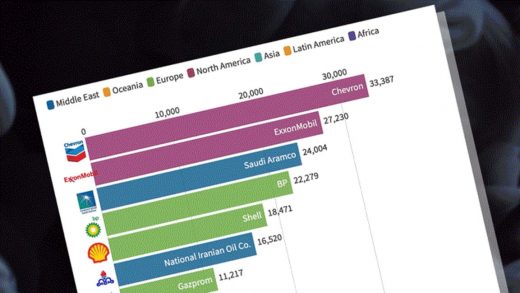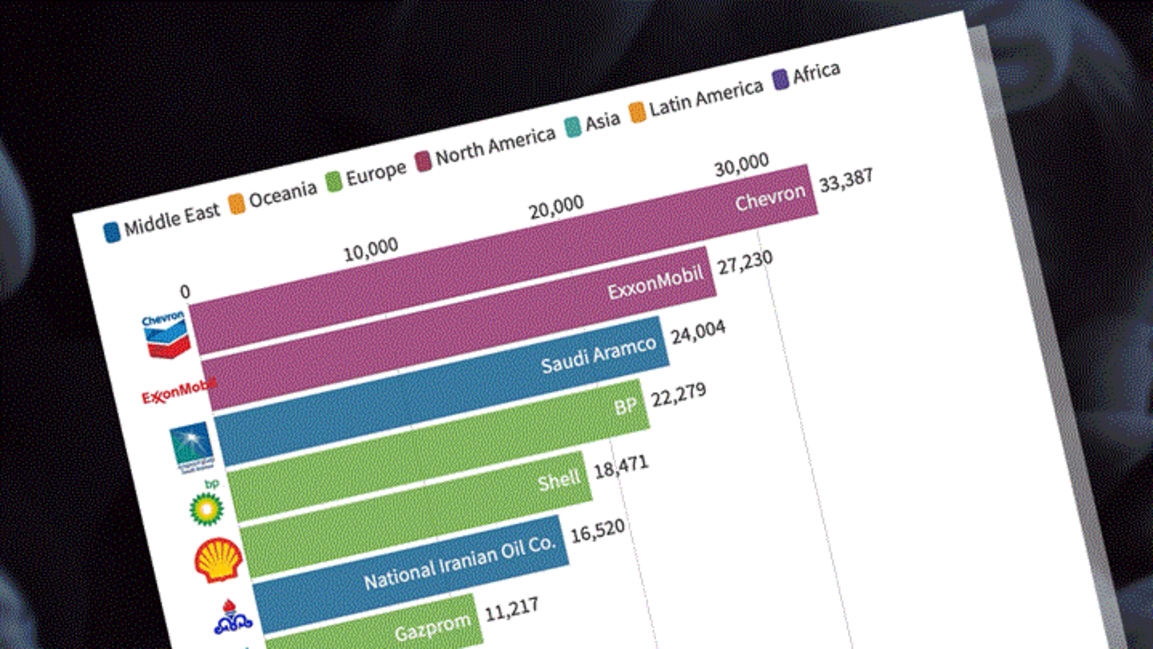Watch in horror as this chart shows the growing emissions from oil and gas companies since 1965
Saudi Aramco, also known as the Saudi Arabian Oil Company, was responsible for 4.38% of carbon dioxide and methane emissions in the time period Heede studied, contributing more than 59.26 billion tons in total. The 20 oil and gas companies that emitted the most accounted for 35.45% of global emissions over the roughly five decades Heede analyzed.
Twelve of the top 20 are state-backed companies, like Gazprom (majority-owned by the Russian government), the National Iranian Oil Company, Coal India, and PetroChina. The remaining eight are investor-owned, such as Chevron (which is second to Saudi Aramco with 43.45 billion tons of carbon dioxide and methane emissions during the study period). ExxonMobil, BP, Royal Dutch Shell, and Peabody Energy are other top investor-owned polluters.
“This whole endeavor started with an analysis of one company over its history, namely Standard Oil, from 1884 to 2002,” says Heede. In this analysis, he estimated the company’s total emissions by examining not only its direct operational output but also the emissions from products Standard Oil “extracted and made available to worldwide consumers,” Heede says. He used the same method in this latest analysis.
In anticipation of Heede’s findings, the Guardian reached out to the most polluting oil and gas companies to see what they had to say for themselves about the destruction they’ve wreaked on the planet. Of those who answered, some, like Shell, insist they “fully support the Paris agreement,” which calls for zero emissions by 2050. Others, such as ExxonMobil, dispute claims made by studies like Heede’s about climate change.
“Our company has voluntarily reduced our emissions by almost 7m tonnes per year since 2009,” a ConocoPhilips representative told the Guardian. Headquartered in the U.S., along with three other companies in the top 20, the study says that ConocoPhilips was behind roughly 15.23 billion tons of carbon dioxide and methane emissions between 1965 and 2017.
Heede started looking at emissions beginning in 1965 because he believes that’s when most oil industry executives would have been first aware of fossil fuels contributing to a changing atmosphere. That year, the President’s Science Advisory Committee’s Environmental Pollution Panel put out a report warning of the harm fossil fuel emissions could cause humans, agriculture, the ocean, and more.
So is there any way for these top 20 companies to help make right the damage they’ve caused the planet?
“That’s up to the various lawsuits that have been filed in several states in the U.S., from local jurisdictions in California, Washington, Maryland, Rhode Island, Colorado, and elsewhere,” says Heede. They’re seeking damages for the costs climate change has incurred thus far by destroying the likes of coastlines and the infrastructure located there.
One way these companies do have a shot at reducing their emissions would be through carbon capture and sequestration, says Heede. This refers to technology that can dramatically reduce carbon dioxide emissions from coal and gas plants, but it’s expensive to implement.
Outside calls for major oil and gas companies to take responsibility for their harm may be the most effective means for them to change. “[These companies] can’t publicly commit to respect the science and global requirements,” Heede says. “In aggregate, their production and emissions are still rising when the world is calling for reduced emissions of carbon dioxide and fossil fuels.”
(14)



